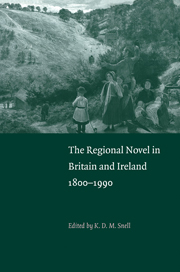Book contents
- Frontmatter
- Contents
- Preface and acknowledgements
- 1 The regional novel: themes for interdisciplinary research
- 2 Regionalism and nationalism: Maria Edgeworth, Walter Scott and the definition of Britishness
- 3 The deep romance of Manchester: Gaskell's ‘Mary Barton’
- 4 Geographies of Hardy's Wessex
- 5 Gender and Cornwall: Charles Kingsley to Daphne du Maurier
- 6 James Joyce and mythic realism
- 7 Cookson, Chaplin and Common: three northern writers in 1951
- 8 Emyr Humphreys: regional novelist?
- 9 Scotland and the regional novel
- 10 Mapping the modern city: Alan Sillitoe's Nottingham novels
- Index
5 - Gender and Cornwall: Charles Kingsley to Daphne du Maurier
Published online by Cambridge University Press: 18 December 2009
- Frontmatter
- Contents
- Preface and acknowledgements
- 1 The regional novel: themes for interdisciplinary research
- 2 Regionalism and nationalism: Maria Edgeworth, Walter Scott and the definition of Britishness
- 3 The deep romance of Manchester: Gaskell's ‘Mary Barton’
- 4 Geographies of Hardy's Wessex
- 5 Gender and Cornwall: Charles Kingsley to Daphne du Maurier
- 6 James Joyce and mythic realism
- 7 Cookson, Chaplin and Common: three northern writers in 1951
- 8 Emyr Humphreys: regional novelist?
- 9 Scotland and the regional novel
- 10 Mapping the modern city: Alan Sillitoe's Nottingham novels
- Index
Summary
If readers had to guess the content of Daphne du Maurier's two best-known novels, Jamaica Inn and Rebecca from the names of their locations – Jamaica Inn and Manderley respectively – what would they conclude? Taking the publication dates into account, they might surmise that the novels were late examples of Rider Haggard-like imperial fiction or a contribution to the tradition of women's imperial romance of which E. M. Hull's The Sheik is the most famous example. It is hardly likely that the names of the locations would lead readers to assume that du Maurier's novels are predominantly set in Cornwall.
The ‘odd’ names given to the locations may be an example of du Maurier's historical literacy, and in the case of Jamaica Inn may allude to the sea traffic between the Caribbean and Cornwall. For instance, in a note prefacing Jamaica Inn, du Maurier makes the ritual claim that all characters and events are entirely imaginary, but she also claims that Jamaica Inn refers to an actual Inn of that name on the road between Bodmin and Launceston. But even when one has reflected on possible explanations there seems at the very least something curiously and deliberately exotic about the choice of names – and even some of the descriptions: Bodmin Moor, for example, is referred to several times in Jamaica Inn as ‘motionless as desert sand’. There is nothing unique about the presence of exoticism in thirties works. For instance Rebecca shares with an even more unlikely ‘regional’ work – George Orwell's The Road to Wigan Pier – a fascination with colonial places.
- Type
- Chapter
- Information
- The Regional Novel in Britain and Ireland1800–1990, pp. 119 - 135Publisher: Cambridge University PressPrint publication year: 1998
- 3
- Cited by



